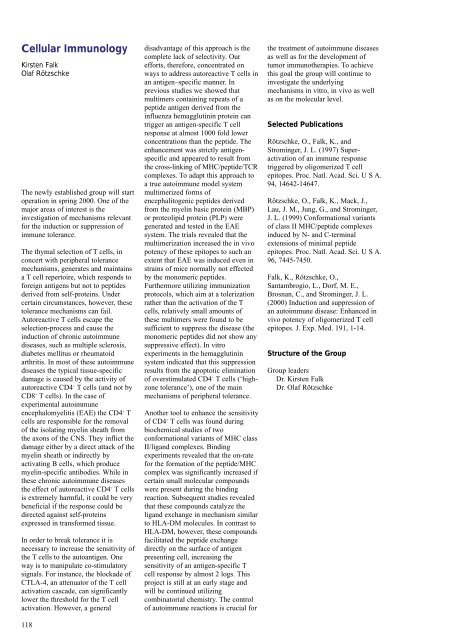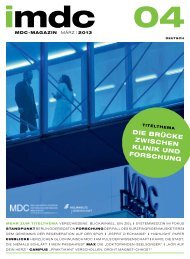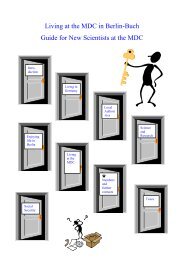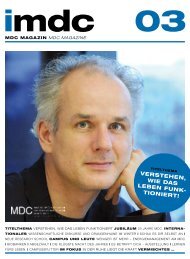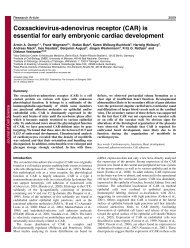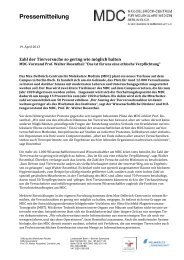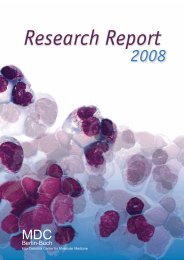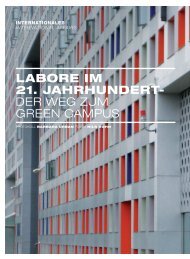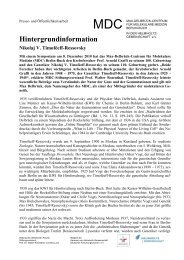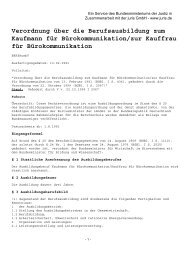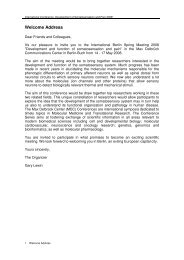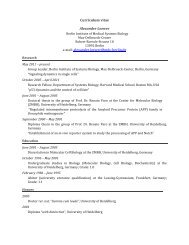You also want an ePaper? Increase the reach of your titles
YUMPU automatically turns print PDFs into web optimized ePapers that Google loves.
Cellular Immunology<br />
Kirsten Falk<br />
Olaf Rötzschke<br />
The newly established group will start<br />
operation in spring <strong>2000</strong>. One of the<br />
major areas of interest is the<br />
investigation of mechanisms relevant<br />
for the induction or suppression of<br />
immune tolerance.<br />
The thymal selection of T cells, in<br />
concert with peripheral tolerance<br />
mechanisms, generates and maintains<br />
a T cell repertoire, which responds to<br />
foreign antigens but not to peptides<br />
derived from self-proteins. Under<br />
certain circumstances, however, these<br />
tolerance mechanisms can fail.<br />
Autoreactive T cells escape the<br />
selection-process and cause the<br />
induction of chronic autoimmune<br />
diseases, such as multiple sclerosis,<br />
diabetes mellitus or rheumatoid<br />
arthritis. In most of these autoimmune<br />
diseases the typical tissue-specific<br />
damage is caused by the activity of<br />
autoreactive CD4 + T cells (and not by<br />
CD8 + T cells). In the case of<br />
experimental autoimmune<br />
encephalomyelitis (EAE) the CD4 + T<br />
cells are responsible for the removal<br />
of the isolating myelin sheath from<br />
the axons of the CNS. They inflict the<br />
damage either by a direct attack of the<br />
myelin sheath or indirectly by<br />
activating B cells, which produce<br />
myelin-specific antibodies. While in<br />
these chronic autoimmune diseases<br />
the effect of autoreactive CD4 + T cells<br />
is extremely harmful, it could be very<br />
beneficial if the response could be<br />
directed against self-proteins<br />
expressed in transformed tissue.<br />
In order to break tolerance it is<br />
necessary to increase the sensitivity of<br />
the T cells to the autoantigen. One<br />
way is to manipulate co-stimulatory<br />
signals. For instance, the blockade of<br />
CTLA-4, an attenuator of the T cell<br />
activation cascade, can significantly<br />
lower the threshold for the T cell<br />
activation. However, a general<br />
118<br />
disadvantage of this approach is the<br />
complete lack of selectivity. Our<br />
efforts, therefore, concentrated on<br />
ways to address autoreactive T cells in<br />
an antigen–specific manner. In<br />
previous studies we showed that<br />
multimers containing repeats of a<br />
peptide antigen derived from the<br />
influenza hemagglutinin protein can<br />
trigger an antigen-specific T cell<br />
response at almost 1000 fold lower<br />
concentrations than the peptide. The<br />
enhancement was strictly antigenspecific<br />
and appeared to result from<br />
the cross-linking of MHC/peptide/TCR<br />
complexes. To adapt this approach to<br />
a true autoimmune model system<br />
multimerized forms of<br />
encephalitogenic peptides derived<br />
from the myelin basic protein (MBP)<br />
or proteolipid protein (PLP) were<br />
generated and tested in the EAE<br />
system. The trials revealed that the<br />
multimerization increased the in vivo<br />
potency of these epitopes to such an<br />
extent that EAE was induced even in<br />
strains of mice normally not effected<br />
by the monomeric peptides.<br />
Furthermore utilizing immunization<br />
protocols, which aim at a tolerization<br />
rather than the activation of the T<br />
cells, relatively small amounts of<br />
these multimers were found to be<br />
sufficient to suppress the disease (the<br />
monomeric peptides did not show any<br />
suppressive effect). In vitro<br />
experiments in the hemagglutinin<br />
system indicated that this suppression<br />
results from the apoptotic elimination<br />
of overstimulated CD4 + T cells (‘highzone<br />
tolerance’), one of the main<br />
mechanisms of peripheral tolerance.<br />
Another tool to enhance the sensitivity<br />
of CD4 + T cells was found during<br />
biochemical studies of two<br />
conformational variants of MHC class<br />
II/ligand complexes. Binding<br />
experiments revealed that the on-rate<br />
for the formation of the peptide/MHC<br />
complex was significantly increased if<br />
certain small molecular compounds<br />
were present during the binding<br />
reaction. Subsequent studies revealed<br />
that these compounds catalyze the<br />
ligand exchange in mechanism similar<br />
to HLA-DM molecules. In contrast to<br />
HLA-DM, however, these compounds<br />
facilitated the peptide exchange<br />
directly on the surface of antigen<br />
presenting cell, increasing the<br />
sensitivity of an antigen-specific T<br />
cell response by almost 2 logs. This<br />
project is still at an early stage and<br />
will be continued utilizing<br />
combinatorial chemistry. The control<br />
of autoimmune reactions is crucial for<br />
the treatment of autoimmune diseases<br />
as well as for the development of<br />
tumor immunotherapies. To achieve<br />
this goal the group will continue to<br />
investigate the underlying<br />
mechanisms in vitro, in vivo as well<br />
as on the molecular level.<br />
Selected Publications<br />
Rötzschke, O., Falk, K., and<br />
Strominger, J. L. (1997) Superactivation<br />
of an immune response<br />
triggered by oligomerized T cell<br />
epitopes. Proc. Natl. Acad. Sci. U S A.<br />
94, 14642-14647.<br />
Rötzschke, O., Falk, K., Mack, J.,<br />
Lau, J. M., Jung, G., and Strominger,<br />
J. L. (1999) Conformational variants<br />
of class II MHC/peptide complexes<br />
induced by N- and C-terminal<br />
extensions of minimal peptide<br />
epitopes. Proc. Natl. Acad. Sci. U S A.<br />
96, 7445-7450.<br />
Falk, K., Rötzschke, O.,<br />
Santambrogio, L., Dorf, M. E.,<br />
Brosnan, C., and Strominger, J. L.<br />
(<strong>2000</strong>) Induction and suppression of<br />
an autoimmune disease: Enhanced in<br />
vivo potency of oligomerized T cell<br />
epitopes. J. Exp. Med. 191, 1-14.<br />
Structure of the Group<br />
Group leaders<br />
Dr. Kirsten Falk<br />
Dr. Olaf Rötzschke


